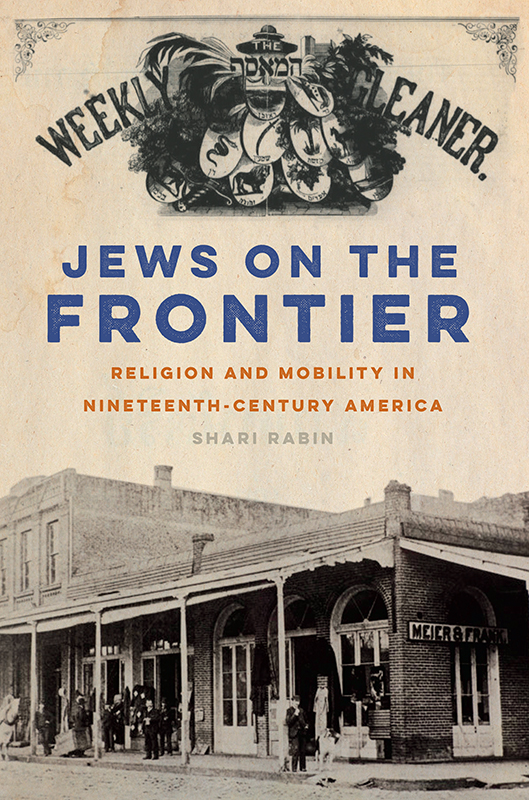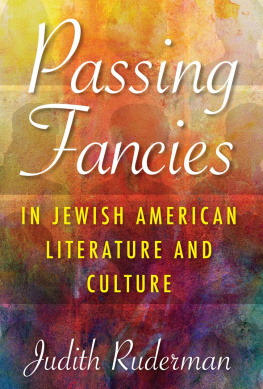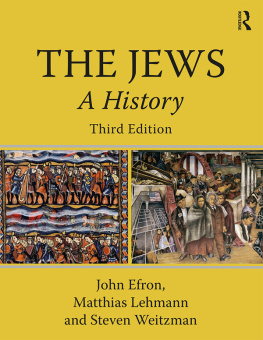
Jews on the Frontier
North American Religions
Series Editors: Tracy Fessenden (Religious Studies, Arizona State University), Laura Levitt (Religious Studies, Temple University), and David Harrington Watt (History, Temple University)
In recent years a cadre of industrious, imaginative, and theoretically sophisticated scholars of religion have focused their attention on North America. As a result the field is far more subtle, expansive, and interdisciplinary than it was just two decades ago. The North American Religions series builds on this transformative momentum. Books in the series move among the discourses of ethnography, cultural analysis, and historical study to shed new light on a wide range of religious experiences, practices, and institutions. They explore topics such as lived religion, popular religious movements, religion and social power, religion and cultural reproduction, and the relationship between secular and religious institutions and practices. The series focuses primarily, but not exclusively, on religion in the United States in the twentieth and twenty-first centuries.
Books in the Series
Ava Chamberlain, The Notorious Elizabeth Tuttle: Marriage, Murder, and Madness in the Family of Jonathan Edwards
Terry Rey and Alex Stepick, Crossing the Water and Keeping the Faith: Haitian Religion in Miami
Jodi Eichler-Levine, Suffer the Little Children: Uses of the Past in Jewish and African American Childrens Literature
Isaac Weiner, Religion Out Loud: Religious Sound, Public Space, and American Pluralism
Hillary Kaell, Walking Where Jesus Walked: American Christians and Holy Land Pilgrimage
Brett Hendrickson, Border Medicine: A Transcultural History of Mexican American Curanderismo
Annie Blazer, Playing for God: Evangelical Women and the Unintended Consequences of Sports Ministry
Elizabeth Prez, Religion in the Kitchen: Cooking, Talking, and the Making of Black Atlantic Traditions
Kerry Mitchell, Spirituality and the State: Managing Nature and Experience in Americas National Parks
Finbarr Curtis, The Production of American Religious Freedom
M. Cooper Harriss, Ralph Ellisons Invisible Theology
Shari Rabin, Jews on the Frontier: Religion and Mobility in Nineteenth-Century America
Jews on the Frontier
Religion and Mobility in Nineteenth-Century America
Shari Rabin

NEW YORK UNIVERSITY PRESS
New York
NEW YORK UNIVERSITY PRESS
New York
www.nyupress.org
2017 by New York University
All rights reserved
References to Internet websites (URLs) were accurate at the time of writing. Neither the author nor New York University Press is responsible for URLs that may have expired or changed since the manuscript was prepared.
ISBN : 978-1-4798-3047-3
For Library of Congress Cataloging-in-Publication data, please contact the Library of Congress.
New York University Press books are printed on acid-free paper, and their binding materials are chosen for strength and durability. We strive to use environmentally responsible suppliers and materials to the greatest extent possible in publishing our books.
Manufactured in the United States of America
10 9 8 7 6 5 4 3 2 1
Also available as an ebook
Contents
I have been almost as mobile as my subjects in the years Ive spent writing about them, and I too found support, camaraderie, and community along the way. Now, at the end of the journey, it is a pleasure to identify and thank these people. The research for this project was supported by the American Jewish Archives, the American Jewish Historical Society, the Memorial Foundation for Jewish Culture, the Myer and Rosaline Feinstein Center for American Jewish History, the Virginia Historical Society, and Yale Universitys Ganzfried Travel Fellowship. The Southern Jewish Historical Society awarded this book a much-appreciated subvention grant.
The ideas that informed this book originated in conversations with Stephen Prothero and Tisa Wenger and benefited from the guidance of Skip Stout, Ivan Marcus, and the late great Paula Hyman. Lee Shai Weissbach, Adam Mendelsohn, Lila Corwin Berman, Michael Meyer, David Sorkin, and Beth Wenger offered crucial feedback on parts of this work at various stages of its writing. Sarah Koenig, Emily Johnson, Alex Kaloyanides, Michelle Morgan, and Sara Ronis also profoundly shaped this work. I am especially grateful to Kati Curts, Lucia Hulsether, and Nathan Kurz for their keen and insightful feedback.
Three remarkable mentors have been especially crucial to my success. Thanks to Eliyahu Stern for his lengthy and enthusiastic telephone conversations, to Jonathan Sarna for his endless generosity and deep knowledge, and to Kathryn Lofton for her breadth and theoretical rigor and for the clarity of her intellectual, professional, and personal guidance. Thanks also to Jennifer Hammer, Amy Klopfenstein, and New York University Press for their impeccable support and expertise. I finished writing this book in Charleston, a community even older than the ones I discuss in this book, and a beautiful new home from which to contemplate questions of religion, movement, and belonging. My thanks to my colleagues in the Yaschik/Arnold Jewish Studies Program, and especially to David Slucki, Elijah Siegler, and Dale Rosengarten, who have become phenomenal conversation partners for me at the College of Charleston.
I spent most of my twenties immersed in the nineteenth century, but friends in New Haven, Brooklyn, Charleston, and elsewhereyou know who you arehave not only been my best cheerleaders but also have made my life in the twenty-first century a lot more fun. I especially want to thank Carly Siegel, who has been providing moral support and welcome distraction in the exact right proportions since we were in high school. My familyin all its locations and iterations, old and newhas always provided unwavering love and support. I feel lucky to come from them. Finally, this is for my mother, Susan Jacobs Schaer, and to the memory of my grandmother, Esther Forman Jacobs. I know of no better examples of how to traverse lifes journey cheerfully and resourcefully, no matter the bumps or diversions.
Judaism, America, Mobility
In 1858, seventeen-year-old Edward Rosewater was learning the telegraph trade and roaming the Midwest trying to find a job. Born in Bukovan, Bohemia, but raised in Cleveland, Ohio, he now passed through Cincinnati, Oberlin, parts of Kentucky, and St. Louis in search of work before getting a job as a telegraph operator in Murfreesboro, Tennessee. He later relocated to Stevenson, Alabama; Nashville; and Washington, D.C., before finally settling in Omaha, Nebraska. As he moved in and out of places with and without Jewish communities, Rosewaters religious life was flexible, to say the least. In his diary, he rarely mentioned Jewish holidays but described sending valentines and noted Washingtons Birth Day. He attended church semi-regularly, including Methodist, Baptist, Catholic, and Episcopalian services as well as a Tennessee camp meeting, and he read the Book of Mormon, which he deemed a big lot [of] trash.
Rosewater remained close to his family, sending them money and letters, even as he had a variety of interactions with the non-Jews who surrounded him, ranging from fistfights to courtships. He rode trains and worked the telegraph on Saturdays, violating the Sabbath, and ate non-kosher food, including Alabama barbecue and pork rinds. And yet Rosewaters diary does show evidence of traditional Jewish interests. He attended synagogue when in larger cities like Cleveland, Cincinnati, and Nashville, and interacted with some of Americas great rabbis. When Rabbi Bernard Illowy stopped in Nashville en route to a new position in New Orleans, Rosewater showed his son around, and later on, when visiting the Smithsonian Institution in Washington, he found [rabbis Isaac Mayer] Wise & [Max] Lilienthal there. Introduced myself to Wise & showed them [the] Indian Gallery.
Next page






